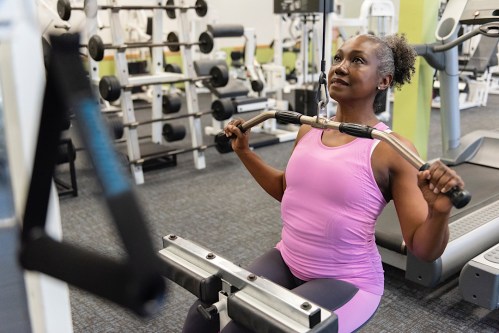Think You’re Too Old To Start Lifting Weights? Think Again—The Benefits Only Increase As You Age
Despite what apps and Instagram may present, youth is not a prereq for resistance training. Here, a case for weight lifting as you get older.

If your only sources were fitness apps, Instagram, and FitTok, you’d be forgiven for thinking that youth was a prerequisite for resistance training. It’s hard to find instructors even in their 40s on workout videos or social media posts, let alone swole models over 50. But the upsides of weight lifting—namely getting stronger and reducing your risk of chronic health conditions—only appreciate over time.
Experts in This Article
exercise physiologist and certified personal trainer
“The benefits of lifting weights don’t necessarily change as you get older, but there are some that become more relevant and important as you age,” says Sharon Gam, PhD, CSCS, an exercise physiologist and certified strength and conditioning specialist. “Most people lose muscle mass, a condition known as sarcopenia. When you lose muscle mass and strength, it becomes harder to complete daily activities, and people can lose their ability to function and be independent.”
Strength training helps mitigate that loss, she says, which can increase your chances of living a longer, healthier life, however you see fit. “Loss of muscle and strength also contributes to the risk of falling, but weight lifting can help improve coordination and decrease that risk,” Dr. Gam says. “One study, for example, found that fall risk in older women was reduced by 57 percent after a six-month strength training program.”
It’s not just about your muscles
Our bones are also important to pay attention to as we age. As we grow older, we start to lose bone density, which can lead to osteopenia and osteoporosis, two bone-loss related conditions that are more common after age 50. “Weight lifting directly stimulates bones to get stronger and denser,” Dr. Gam says.
Brain function can also start to decrease, and the risk of dementia increases. “Strength training has incredible effects on the brain, releasing chemicals like neurotrophic factors that protect brain cells and build connections between brain areas,” Dr. Gam says. “Strength training reduces the risk of Alzheimer’s disease and other types of dementia.”
Throughout the body, the effects of strength training are seriously powerful, according to Dr. Gam. “For example, a study in 2019 found that resistance training was associated with a 40 to 70 percent decreased risk of cardiovascular events (like heart attacks or strokes), and a similar decreased risk of death from cardiovascular disease and death from any cause,” she says. “Studies have also found that strength training can reduce blood pressure and improve blood cholesterol, and it’s associated with improvements in brain function, self-confidence and self-esteem,sleep, mood, and energy.”
TL;DR: “It really can make every aspect of your life better!” she says. Hard to argue with that.
The safest way to start lifting weights at any age
As a certified strength and conditioning coach, Dr. Gam specializes in helping people begin resistance training. “If you’re just getting started, weight machines can provide some support so you don’t have to worry about losing your balance or dropping a weight,” she says. “Resistance bands are another safe and relatively easy way to start building some strength and muscle.” The key is just to start with very light weights or bands, and work your way up.
Once you build some baseline strength and confidence with machines and resistance bands, Dr. Gam recommends learning how to use free weights like dumbbells. “At that point it’s a good idea to meet with a personal trainer, even just for a few sessions, so they can teach you how to perform the exercises that are appropriate for you with proper form,” she says.
Regardless of your age, the American College of Sports Medicine and the Centers for Disease Control recommend every adult strength train at least two times per week. “Work all of your major muscle groups in each session,” Dr. Gam says. “That includes legs, chest, back, shoulders, arms, calves, and core. More is better, but two times per week is a good start.”
This full-body resistance band workout is a great starting point if you’re new to strength training:
Sign Up for Our Daily Newsletter
Get all the latest in wellness, trends, food, fitness, beauty, and more delivered right to your inbox.
Got it, you've been added to our email list.










